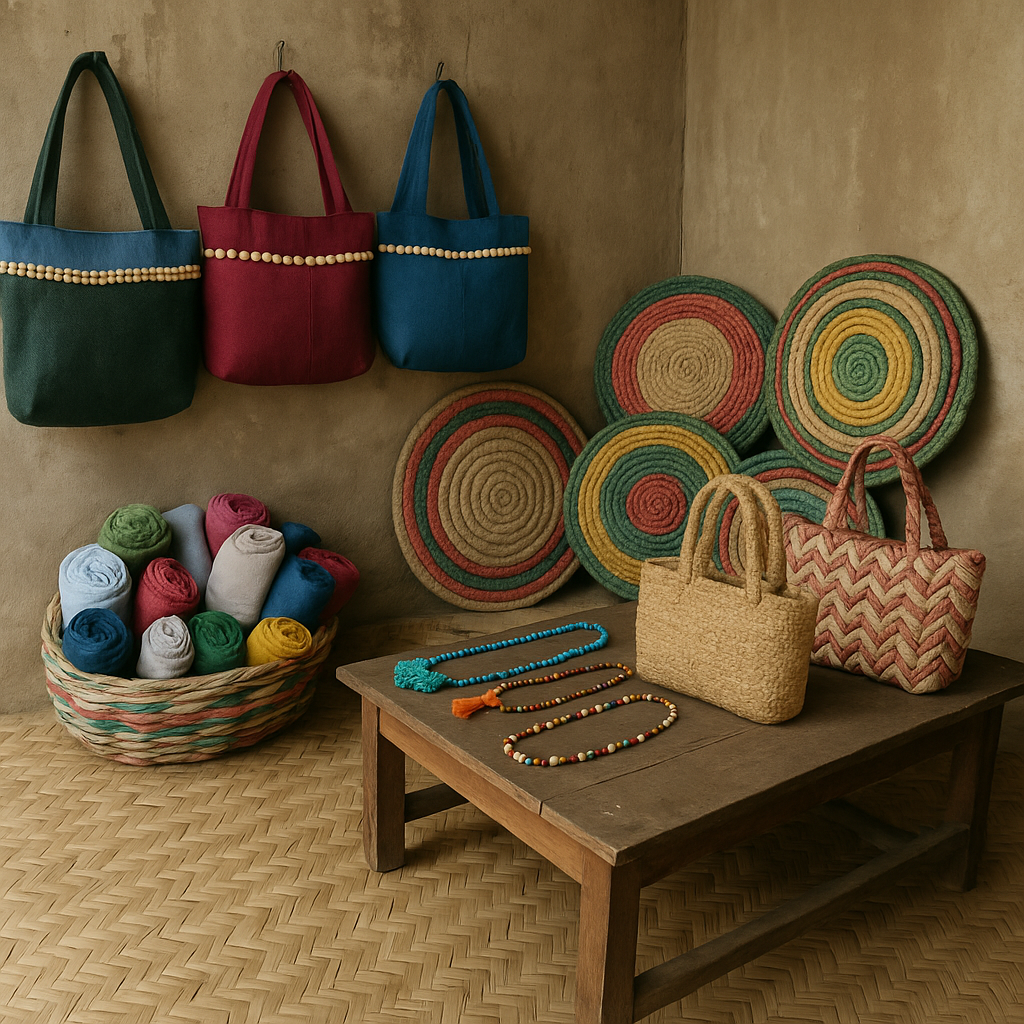
N.B. This photo is not real, it is an AI-generated one.
The Problem and Motivation behind:
“So many women in my community wanted to work but didn’t have opportunities. I realised that if I could train them in recycling and crafting, we could create something valuable together.” – Mosaddek
Mosaddek (21 years old) and his team witnessed firsthand how waste management had become a significant challenge in their community. Discarded fabrics, old clothes, and plastic items were piling up, often creating environmental hazards. However, instead of viewing waste as useless, they recognised its potential.
They began to think about how they could transform discarded materials into beautiful, handcrafted products while simultaneously creating jobs for disadvantaged young women. These women, including widows and those with limited education, often lack skills and financial opportunities, making it difficult for them to find stable employment and escape poverty. Mosaddek and his team wanted to change that by turning waste into a valuable resource while providing an income source for women.
The Innovative Solution:
“People throw away old, torn clothes thinking they are useless. But when we turn them into stylish handbags, they look brand new and valuable!” – Mosaddek.
Mosaddek founded Skilled Handiwork, a youth-led solution that collects discarded materials like old clothes, plastic items, and other waste, and upcycles them into handcrafted products. The project employs women from low-income backgrounds, training them to create jewellery, doormats, floor mats, jute bags, and other handmade items.
Through a Design Thinking process, Mosaddek and his tea spent time talking to local women to understand their challenges. They learned that most of them lacked skills and felt they could not earn independently. Then, they brainstormed ways to reuse discarded waste items, and explored different ideas crafting handmade products that could be useful and marketable in their community. They started with developed different prototypes for their recycled products, like handbags made from old clothes, and added small decorative beads to increase their appeal. They showed their products in the local market to test customers’ interest. The feedback was overwhelmingly positive, and customers appreciated the attractive and eco-friendly designs of their products.
Since starting in 2022, Mosaddek and his team has trained and employed 60 women, many of whom are widows or from marginalised backgrounds. Products are sold online through customised orders, as well as in local markets. They followed a customised, order-based model, meaning that every product is made according to customer demand. This approach reduces waste and ensures that resources are used efficiently. Currently, Mosaddek and his team generate a monthly income of BDT 20,000 to 25,000 (US$ 160 – 200), with peak months reaching higher revenue. Their solution has contributed to the economic empowerment of women who previously had no income. “At first, these women didn’t believe they could do it. But after training, they gained confidence and are now earning their own income.” – Mosaddek adds.
Lessons Learned and Addressing Challenges Faced:
“When I joined the Innovation Lab, I was just an ordinary youth with an idea. Winning the district-level competition changed how people saw me. It gave me the confidence to keep going, even when the national competition didn’t go as planned,” Mosaddek.
The Youth Innovation Lab provided Mosaddek and his team with training to learn about business planning, product development, and community engagement. They also were connected with mentors who helped him in refining the quality of their products and training women to produce the recycled products.
Reflecting on their experience, Mosaddek identified three lessons learned:
- Diversifying products are essential for business sustainability – Initially, Mosaddek focused solely on recycling old clothes. However, he soon realised that diversifying the products to include mats, jute bags, and plastic-based items would make the business more sustainable.
- Sourcing new materials to complement recycled ones – While Mosaddek and his team aimed to make products entirely from waste, they soon realised that some new elements (like beads and decorative items) were essential to make the products attractive and durable. To address this, they began sourcing affordable materials from nearby towns. “Recycling doesn’t mean using only old stuff. Sometimes, adding a little new material makes the product better and more appealing,” Mosaddek explained.
- Relying on online sales to avoid licensing issues of having a physical store – Mosaddek and his team operates entirely online because getting a trade license for a shop was complicated and expensive. “We don’t have a physical shop, but that didn’t stop us. We take orders online and deliver customised products. It works!” – Mosaddek explains.
Next Steps and Future Aspirations:
“My dream is to see our products being sold nationwide. I want more women to feel the pride of earning their own money. We started small, but with persistence and community support, we can grow much bigger,” Mosaddek.
Looking ahead, Mosaddek and his team have ambitious plans for Skilled Handiwork:
- Increase the number of employed women from 60 to 200, offering more training opportunities.
- Expand product lines by exploring new recycled materials, including plastic mugs and other discarded household items.
- Set up a physical shop once the trade license issue is resolved, to complement the online business.
- Partner with other recycling initiatives to enhance the quality and variety of products.